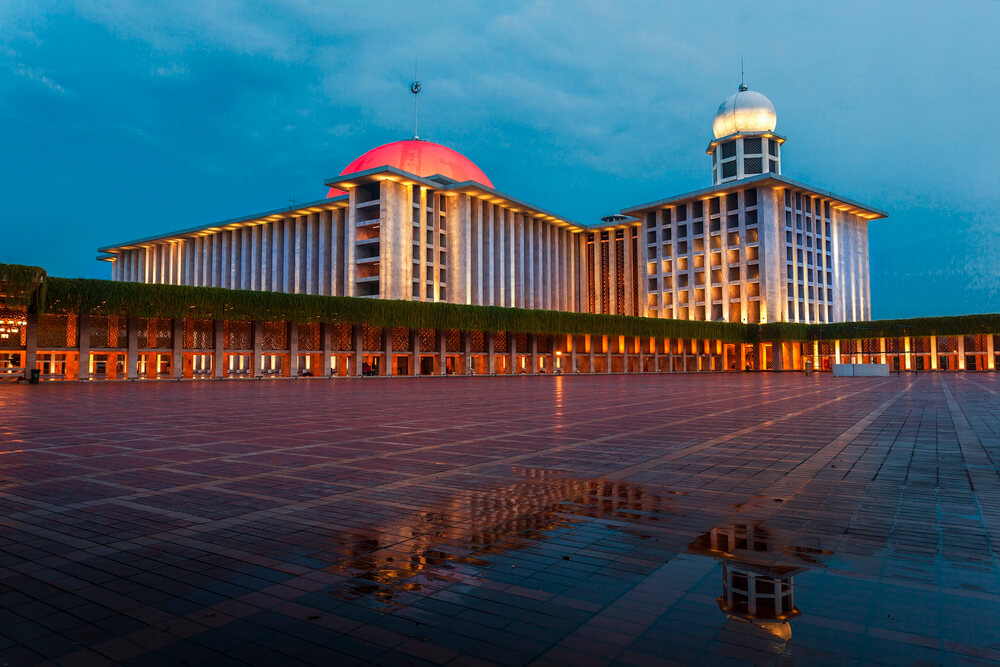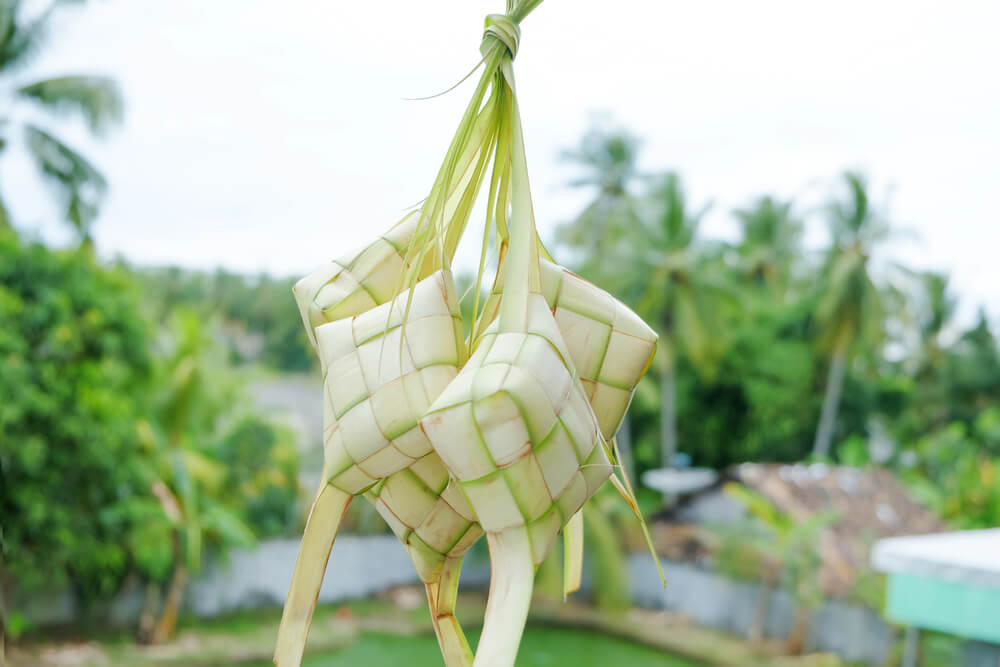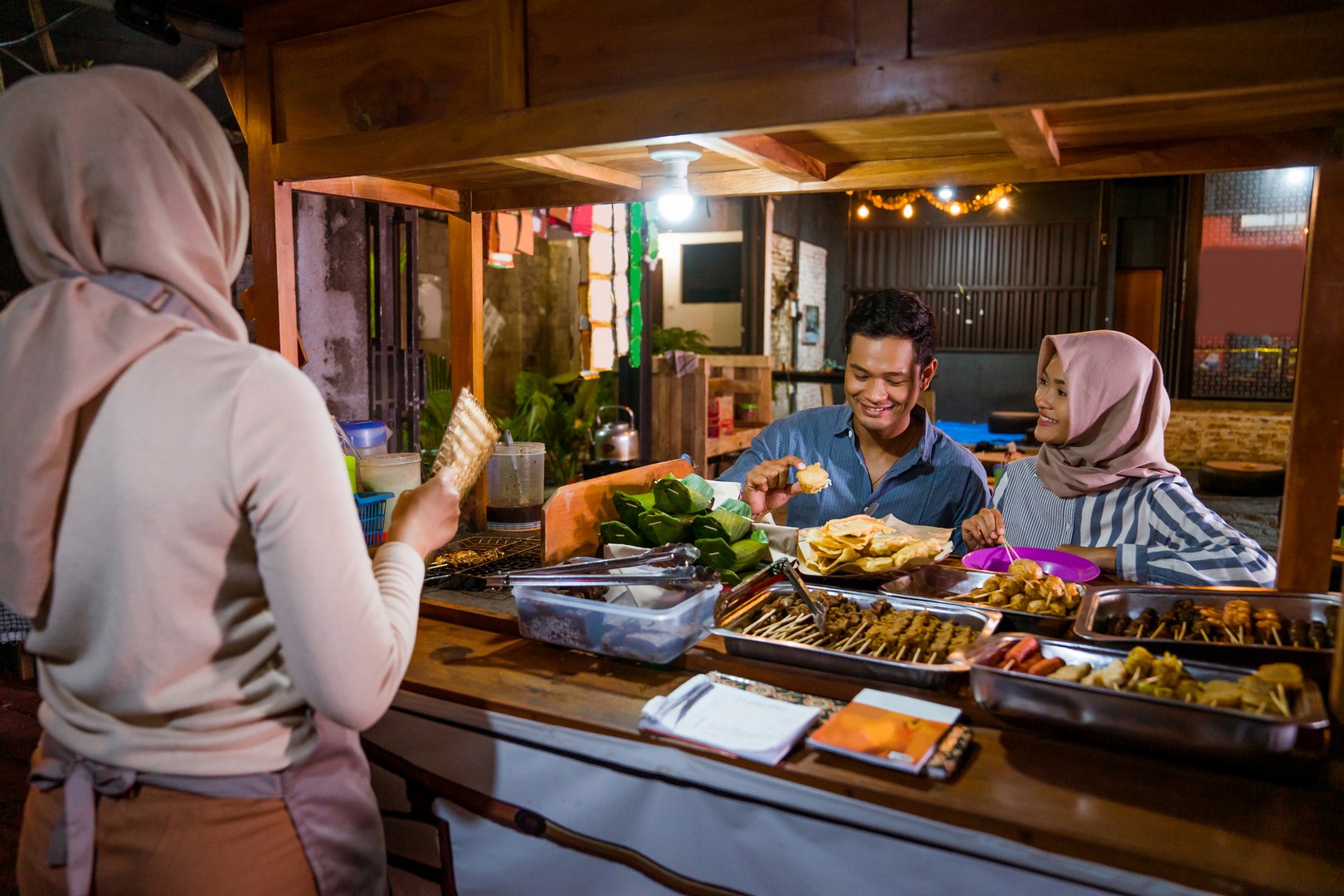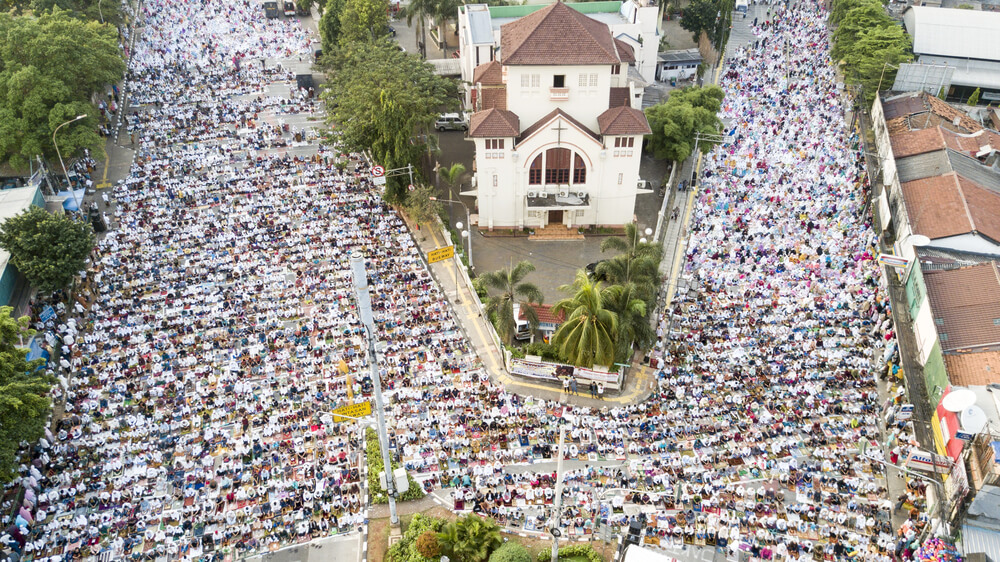If you’re thinking about traveling to Java during Ramadan or Idul Fitri, get ready for a unique experience. This time of the year transforms everyday life, and as a traveler, you’ll feel it too. Some things might be trickier—like finding lunch or getting around during the holiday rush—but there are also some unique moments to experience, like sharing an iftar meal with locals or wandering through vibrant night markets.
Here’s what it’s really like and how to make the most of it.
What Is Ramadan and Idul Fitri?
Ramadan is a holy month when Muslims fast from sunrise to sunset. That means no eating, drinking (yes, even water!), gossiping or smoking in public during the day. As the sun sets, families and friends gather for iftar (the fast-breaking meal), and the streets come alive with food vendors selling various treats.
Most people, especially in villages, truly enjoy fasting. It’s a time for self-reflection, prayer, and togetherness. However, as the day progresses, you’ll notice people getting more tired, especially in the afternoon when energy levels dip. This is something to keep in mind when interacting with locals or booking activities.

While fasting is obligatory for devout Muslims, there are exceptions. Children, menstruating, pregnant, or breastfeeding women, the sick, the mentally ill, and travelers are exempt from fasting for practical reasons. Despite this, many choose to observe Ramadan in some form, even if they are not required to fast.
Idul Fitri (or Lebaran) is the celebration marking the end of Ramadan. It’s like Christmas and New Year’s combined—everyone heads home, businesses shut down, and transport is a chaotic mess. But if you play your cards right, you can have an amazing time soaking in the festive atmosphere.
When is Ramadan Celebrated?
Ramadan is celebrated during the ninth month of the Islamic lunar calendar. Since the Islamic calendar is based on the moon, the exact dates of Ramadan change every year. It typically moves 10–12 days earlier each year in the Gregorian calendar.
- In 2025, Ramadan is expected to begin on the evening of Friday, February 28, and conclude on Sunday, March 30.
- For 2026, it is anticipated to start on the evening of Tuesday, February 17, and end on Wednesday, March 18.

Is It a Good Time to Visit Java?
What’s Great About It:
- The food scene at night is amazing – If you love street food, Ramadan nights are a dream. Look out for sweet treats like kolak (banana and palm sugar dessert) or savory dishes like martabak.
- A unique cultural experience – Ramadan is a time of generosity, and locals are even more welcoming than usual. If you stay in rural areas or guesthouses, there’s a high chance you’ll be invited to dinner or local activities.
- Quieter daytime attractions – Tourist hotspots can be much emptier during fasting hours. If you want Borobudur or Prambanan with fewer crowds, this is the time to go.
The Challenges:
- Eating during the day takes planning – Some restaurants stay open, but many are closed or have discreet entrances (with covered doors). Stick to hotels, malls, or Chinese-run eateries for daytime meals.
- Transportation can be a nightmare – In the days leading up to Idul Fitri, millions of people travel to their hometowns. Book your tickets in advance—whether it’s a train, bus, or flight. Tickets are often released earlier than usual; for example, train tickets that are typically available 30 days before departure may go on sale 45 or even 60 days in advance.
- Shorter business hours – Banks, government offices, and even small shops may close early, especially during Idul Fitri. Immigration offices also shut down, so if you need a visa extension or plan to apply for a visa online, make sure to do it in advance.
- Price increases – Everyday food items, transport fares, and even accommodation prices tend to rise during this period. However, toward the end of the month, many stores offer big discounts and promotions on clothing.
Navigating Ramadan as a Traveler
Food
One of the main challenges is finding food during the day, as many restaurants remain closed until around 3 p.m., when roads become crowded with food vendors preparing for iftar. To avoid getting caught off guard, it’s a good idea to carry some snacks and water with you.
It’s best to eat discreetly in public, but don’t worry—there are no laws prohibiting eating or drinking in public as there are in some Arab countries. If you’re looking for a proper meal, hotels and shopping malls are your safest bet, as their restaurants typically remain open all day. Or you can book online via Gojek or Grab.

In the evening, it’s a different story. You should definitely visit a Ramadan market, which only takes place during the fasting month. They offer a wide variety of local foods. If you’re in Jakarta, you can visit the Benhil Ramadan Market (Bendungan Hilir) or the Sunda Kelapa Ramadan Market in Menteng. Meanwhile, if you’re in Yogyakarta, don’t miss the Kampung Ramadan Jogokaryan, where you can find an array of delicious local dishes at affordable prices.
Transportation
When it comes to getting around, traveling near Idul Fitri can be a nightmare. The massive homecoming exodus (mudik) means that buses, trains, and flights are fully booked, and roads are packed with heavy traffic. If possible, it’s best to stay put for a few days before or up to two weeks after the holiday to avoid the chaos. Even outside of peak travel times, transportation can be slower than usual, as many drivers are fasting and might be less energetic.
Backindo Tip: Traveling to Bali during Ramadan? Expect no disruptions, as the island is primarily Hindu. However, be sure to book domestic flights well in advance, especially around Idul Fitri, when demand soars.
Accommodation
Staying too close to a mosque during Ramadan might not be ideal—especially if you’re a light sleeper. Prayer sessions become more frequent, and some mosques broadcast them over loudspeakers late into the night. If uninterrupted sleep is a priority, consider booking accommodation further from mosques. The night marking the end of Ramadan is particularly noisy, with celebrations continuing into the early morning hours.
Where to book accommodation? Read Best Websites for Booking Accommodation in Indonesia.
What Happens During Idul Fitri?
The last days of Ramadan are electric—markets are packed, people are buying new clothes, and excitement fills the air. Then, on the morning of Idul Fitri, families gather for prayers, and the celebrations begin. If you’re lucky enough to be invited into someone’s home, you’ll be treated to a feast of home-cooked dishes like opor ayam (chicken in coconut milk) and ketupat (rice cakes).
Idul Fitri is the biggest holiday of the year. Families visit relatives, ask for forgiveness, and celebrate together. Almost everything shuts down—shops, restaurants, government offices, and even immigration services.

At the same time, Java’s major cities turn into ghost towns as residents travel to their villages. If you’re in Jakarta, expect eerily empty streets—but if you’re in Yogyakarta or a smaller town, be prepared for large crowds.
Final Thoughts
Traveling in Java during Ramadan and Idul Fitri is different, but it can also be one of the most rewarding cultural experiences. That said, I strongly advise against traveling from/to Jakarta during Idul Fitri and the week following it. I underestimated how chaotic it would be and, a week after Lebaran, I tried traveling to Jakarta. Trains were fully booked, and my only option was a bus from Banjarnegara. What is usually a 9-11 hour trip took me over 24 hours due to massive traffic jams. If you can, avoid this period entirely.
Other than that, I don’t think Ramadan will significantly impact your trip. Just make sure to book your transportation tickets well in advance and plan your meals so you won’t be hungry at lunchtime—that’s all.
Continue reading:
